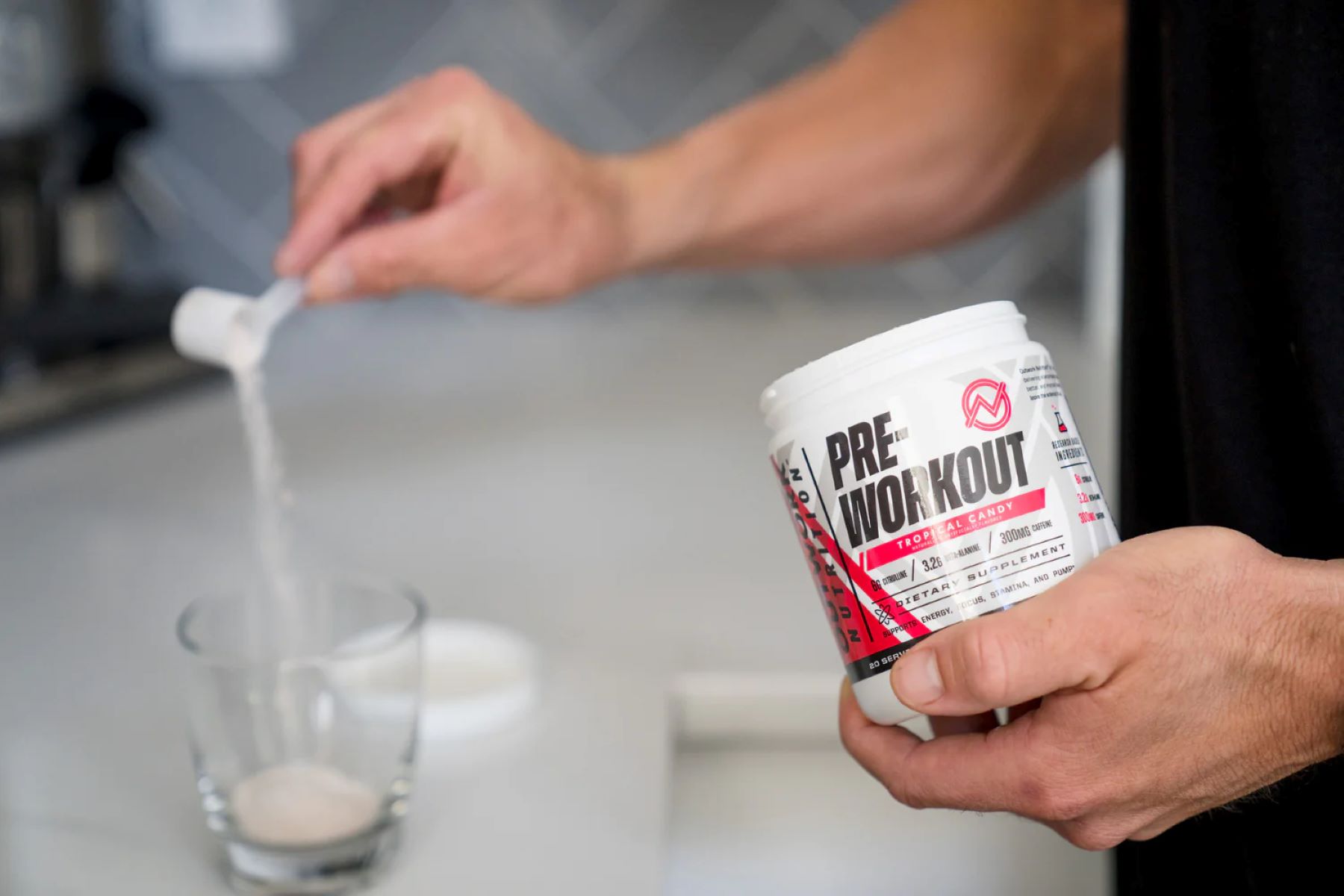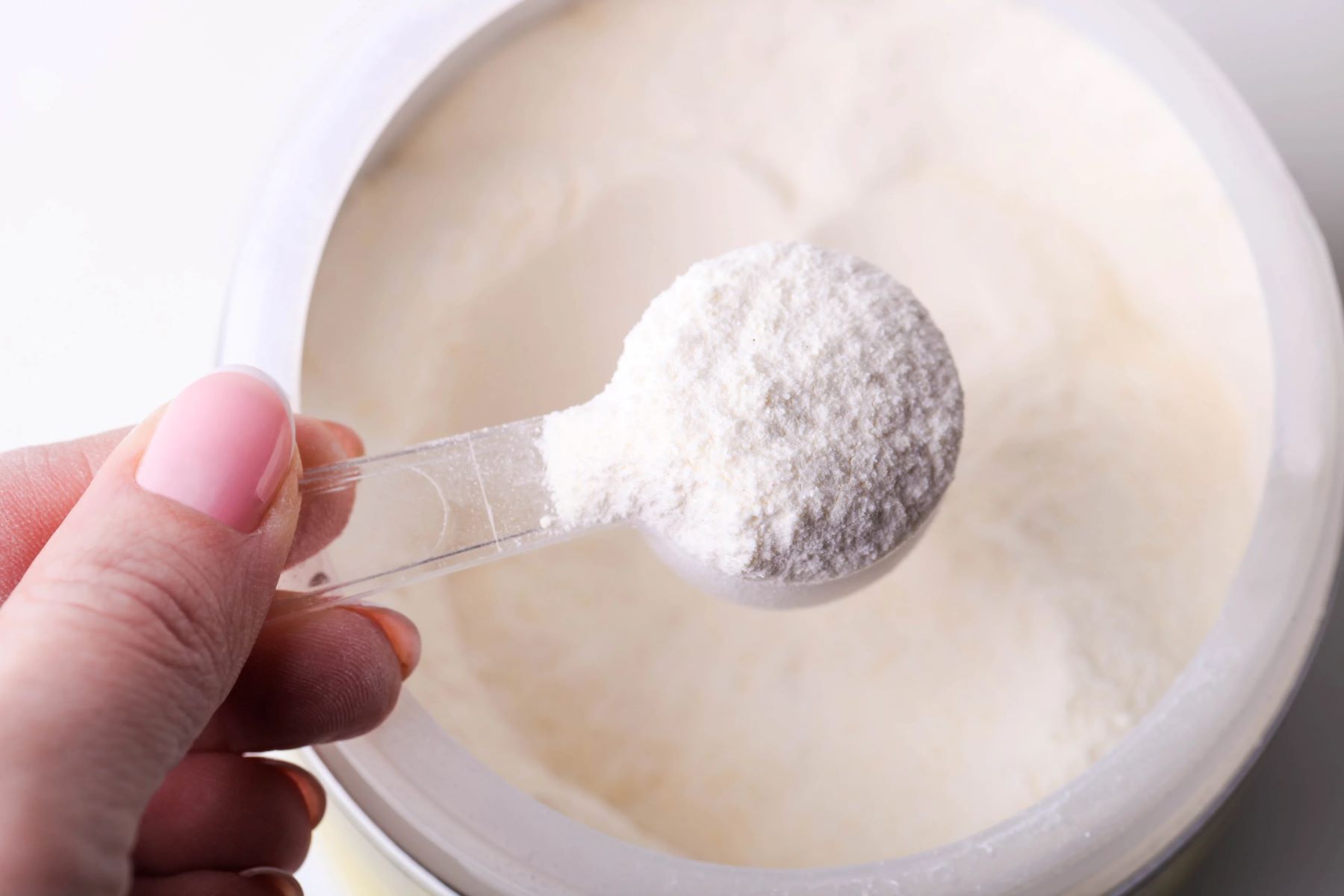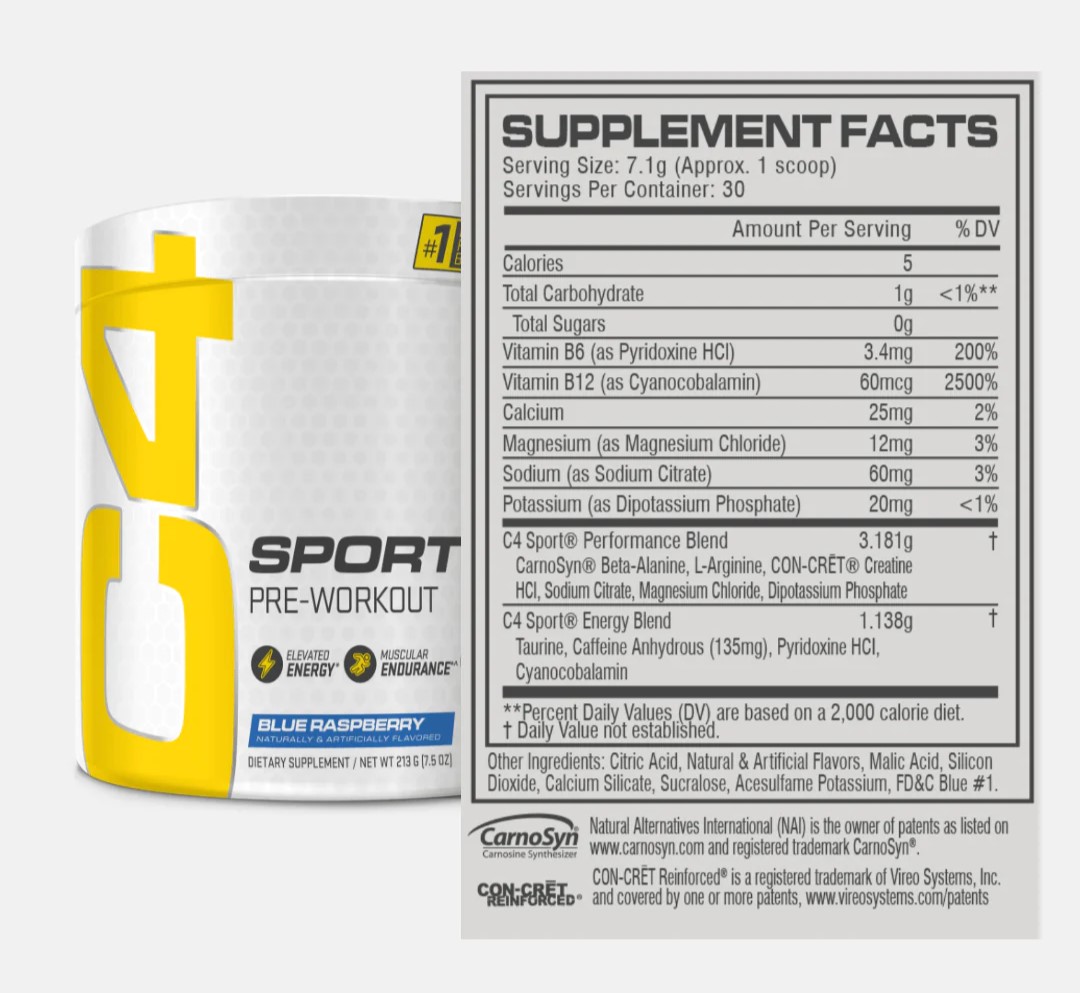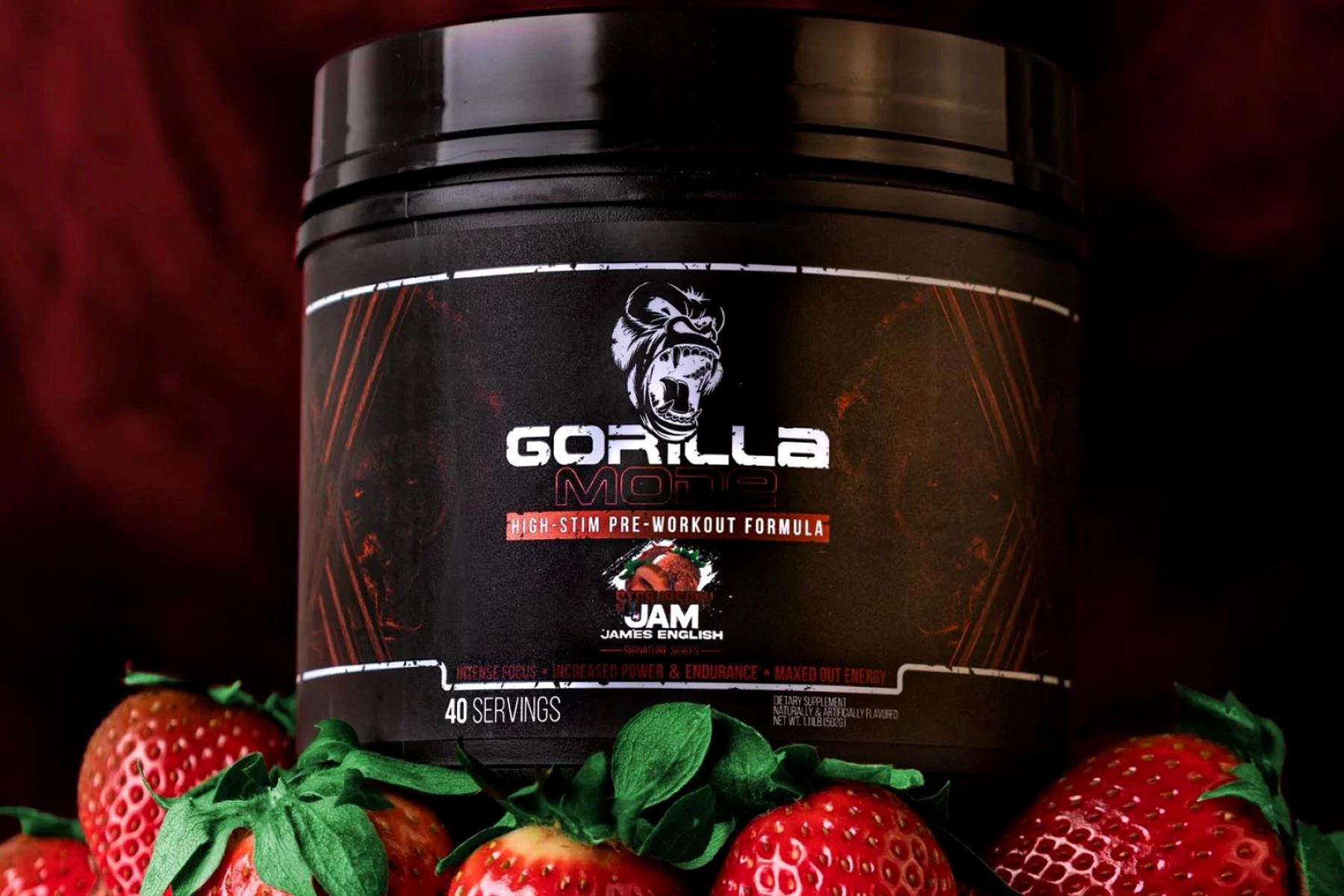

Featured
What To Look For In A Pre-Workout
Modified: August 21, 2023
Looking for a featured pre-workout? Discover what to look for in a quality pre-workout supplement to enhance your gym sessions and maximize your results.
Introduction
When it comes to optimizing your workout performance, a pre-workout supplement can be a game-changer. These supplements are designed to provide you with the energy, focus, and endurance needed to crush your workouts and achieve your fitness goals. However, with countless options available on the market, finding the right pre-workout can be overwhelming.
This article aims to guide you through the process of choosing a pre-workout supplement that suits your needs. From understanding the essential ingredients to avoiding harmful additives, we will cover everything you need to know to make an informed decision. By the end, you’ll be well-equipped to select a pre-workout that will maximize your efforts in the gym.
But first, let’s clarify what exactly pre-workout supplements are. These products are formulated to support physical performance by providing a blend of key ingredients that have been shown to enhance energy, focus, endurance, and muscle power. Pre-workouts often come in powder or pill form and are typically consumed 20-30 minutes before your workout to allow time for the ingredients to take effect.
It’s important to note that pre-workout supplements are not magic pills that will automatically transform your physique. They are intended to be used in conjunction with a balanced diet and regular exercise routine. Pre-workouts provide a boost to help you go the extra mile, push through plateaus, and achieve your fitness goals.
Now that we have a better understanding of pre-workout supplements and their purpose, let’s delve into the essential ingredients you should look for when choosing a pre-workout.
Understanding Pre-Workout Supplements
Before diving into the specific ingredients, it’s important to have a general understanding of how pre-workout supplements work. The purpose of these supplements is to provide you with a burst of energy, heightened focus, and increased endurance during your workouts.
One of the key components of pre-workout supplements is caffeine. Caffeine acts as a stimulant, helping to improve alertness, concentration, and overall performance. It can also enhance fat burning and reduce the perception of effort during intense exercise.
In addition to caffeine, many pre-workouts contain beta-alanine. This amino acid helps to reduce muscle fatigue by buffering acid buildup in the muscles, allowing you to work out for longer periods before feeling fatigued. Beta-alanine also improves muscular endurance, strength, and power output, making it a valuable ingredient for maximizing your workout potential.
Creatine is another common ingredient found in pre-workout supplements. It works by increasing the production of adenosine triphosphate (ATP) in the body, which is the primary form of energy used during high-intensity exercise. By increasing ATP levels, creatine helps to improve strength, power, and muscle growth.
Nitric oxide boosters are also often included in pre-workouts. These ingredients, such as citrulline or arginine, promote increased blood flow and vasodilation, resulting in improved nutrient and oxygen delivery to the muscles. This can enhance muscle pump, endurance, and overall performance.
It’s worth noting that while pre-workout supplements can be highly effective, they may not be suitable for everyone. Individuals who are sensitive to stimulants, have certain medical conditions, or are taking certain medications should consult with their healthcare provider before adding pre-workouts to their regimen.
Now that we have a better understanding of how pre-workout supplements work and the important ingredients they contain, let’s dive deeper into each key ingredient and their specific benefits.
Essential Ingredients to Consider
When selecting a pre-workout supplement, it’s crucial to pay attention to the ingredients and their efficacy. Here are some key ingredients to consider when choosing a pre-workout:
- Caffeine: Caffeine is a popular ingredient in pre-workouts due to its stimulating effects. It increases energy, alertness, and focus, helping you to push through intense workouts. However, be mindful of your caffeine tolerance and avoid exceeding recommended dosage to prevent unwanted side effects like jitters or insomnia.
- Beta-Alanine: Beta-alanine is an amino acid that helps to reduce muscle fatigue and improve endurance. It buffers lactic acid accumulation, allowing you to push yourself further and delay muscle fatigue. Look for pre-workouts that contain the clinically effective dosage of beta-alanine, usually around 3-5 grams.
- Creatine: Creatine is a compound naturally produced in the body and also found in certain foods. It enhances ATP production, providing a quick burst of energy for high-intensity exercises. Creatine has been extensively studied and shown to improve strength, power, and muscle mass. Look for pre-workouts that include creatine monohydrate, the most well-researched and effective form of creatine.
- Nitric Oxide Boosters: Nitric oxide boosters like citrulline or arginine help to increase blood flow and improve oxygen and nutrient delivery to muscles. This leads to enhanced muscle pumps, increased endurance, and improved overall performance. Look for pre-workouts that include an adequate dosage of these ingredients for maximum benefits.
- Other Key Ingredients: Depending on your specific goals and preferences, you may want to look for pre-workouts that include additional ingredients like branched-chain amino acids (BCAAs) for muscle recovery, beta-hydroxy beta-methylbutyrate (HMB) for muscle preservation, or tyrosine for enhanced focus and mood.
Remember, the effectiveness and impact of ingredients can vary from person to person. It’s important to pay attention to your individual tolerance and any sensitivities you may have to certain ingredients. Starting with a lower dosage and gradually increasing based on your body’s response can help optimize your pre-workout experience.
In the next sections, we will explore specific benefits and recommendations for each key ingredient to help you make an informed decision when selecting a pre-workout supplement.
Caffeine Content
Caffeine is a common ingredient found in pre-workout supplements due to its stimulant properties. It can provide a quick boost of energy and enhance focus, making it easier to push through intense workouts. However, it’s important to understand the appropriate caffeine content and dosage for your needs.
The caffeine content in pre-workout supplements can vary widely. Some supplements contain as little as 100 mg per serving, while others may contain 300 mg or more. The optimal caffeine dosage depends on factors such as your caffeine tolerance, body weight, and personal preferences.
For individuals who are sensitive to caffeine or have a low caffeine tolerance, it may be wise to start with a lower dosage, around 100-150 mg per serving. This can help you gauge your body’s reaction and minimize the risk of side effects such as jitters, increased heart rate, or trouble sleeping. Gradually increasing the dosage as tolerated can be a prudent approach.
On the other hand, if you have a higher tolerance or are accustomed to consuming caffeine regularly, a higher dosage of 200-300 mg per serving may be more suitable. However, it’s essential to carefully monitor your intake and not exceed the recommended dosage, as excessive caffeine consumption can lead to adverse effects such as dehydration, anxiety, or gastrointestinal discomfort.
It’s also critical to consider any other dietary sources of caffeine you may be consuming throughout the day, such as coffee, tea, or energy drinks. Taking a pre-workout supplement with a high caffeine content on top of your regular caffeine intake can easily exceed your recommended daily caffeine limit and may have unwanted side effects.
Lastly, it’s important to note that caffeine affects individuals differently. Some people may experience a significant energy boost and improved focus, while others may be more sensitive and experience negative effects. It’s crucial to listen to your body and adjust your caffeine intake accordingly.
When choosing a pre-workout supplement, pay attention to the caffeine content and assess your tolerance and preferences. Consider starting with a lower dosage and gradually increasing if needed. If you’re unsure about your caffeine tolerance or have specific health concerns, it’s always best to consult with a healthcare professional.
Beta-Alanine Benefits
Beta-alanine is an amino acid that plays a crucial role in enhancing workout performance. When consumed as part of a pre-workout supplement, it can provide notable benefits that help you push through intense workouts and achieve better results.
One of the primary benefits of beta-alanine is its ability to reduce muscle fatigue. During high-intensity exercise, the body produces lactic acid, which contributes to muscle fatigue and decreases performance. Beta-alanine acts as a buffer, delaying the buildup of lactic acid and allowing you to work out for longer periods before fatigue sets in.
By reducing muscle fatigue, beta-alanine also helps improve endurance. This means you’ll be able to sustain your performance for a longer duration, leading to more productive training sessions and potentially greater gains in muscle strength and size.
In addition to increasing endurance, beta-alanine has been shown to improve power output. Studies have indicated that supplementing with beta-alanine can lead to increased force production, allowing you to lift heavier weights or generate more power during explosive movements like jumping or sprinting.
Another significant benefit of beta-alanine is its impact on muscle recovery. Intense workouts can cause muscle damage and inflammation, leading to delayed onset muscle soreness (DOMS). Beta-alanine has been found to reduce the perception of muscle soreness and aid in a quicker recovery process, allowing you to get back to your training routine faster.
To reap the benefits of beta-alanine, it’s essential to consume it regularly at the appropriate dosage. The optimal dosage typically ranges from 3-5 grams per day, depending on individual factors such as body weight and training intensity. It’s worth noting that beta-alanine supplementation works best when taken consistently over an extended period. The effects may become more noticeable after several weeks of regular use.
While beta-alanine is generally safe, some individuals may experience a tingling sensation, known as paresthesia, after consuming larger doses. This is a harmless side effect and subsides over time. However, if the sensation is uncomfortable or bothersome, splitting the dosage throughout the day or choosing a supplement that includes a sustained-release form of beta-alanine may help mitigate this effect.
Overall, beta-alanine is a valuable ingredient to look for in pre-workout supplements. Its ability to reduce muscle fatigue, improve endurance, enhance power output, and aid in recovery makes it a valuable tool for maximizing your workout potential and achieving your fitness goals.
Creatine for Improved Performance
Creatine is a naturally occurring compound found in the body and certain foods, such as meat and fish. It is one of the most well-researched and effective ingredients for enhancing exercise performance, making it a popular choice in many pre-workout supplements.
One of the primary benefits of creatine is its ability to increase the production of adenosine triphosphate (ATP) in the body. ATP is the primary source of energy used during high-intensity activities like weightlifting and sprinting. By increasing ATP availability, creatine provides a quick source of energy, allowing you to perform more reps, lift heavier weights, and push through those last difficult sets.
The enhanced energy provided by creatine supplementation can lead to improvements in strength and power. When combined with a proper training program, creatine has been shown to increase muscle strength, leading to better performance in exercises like squatting, bench pressing, and deadlifting. This increased strength can translate into improved athletic performance and greater gains in muscle mass over time.
In addition to its impact on strength and power, creatine has also been found to promote muscle growth. It has the ability to draw water into muscle cells, resulting in increased cell volume and a fuller, more pumped appearance. This effect, known as cell volumization, can lead to improved muscle definition and enhanced muscle size.
Creatine supplementation may also offer benefits beyond strength and muscle growth. Studies have shown that it can improve cognitive function, memory, and reaction time, making it valuable for sports that require high levels of mental focus and concentration.
To experience the benefits of creatine, it’s important to follow proper supplementation guidelines. The most common form of creatine used in supplements is creatine monohydrate. A typical recommended dosage is 3-5 grams of creatine monohydrate per day. Some individuals may choose to go through a loading phase, where they consume a higher dosage (20 grams per day) for the first 5-7 days to rapidly saturate their muscles, followed by a maintenance phase of 3-5 grams per day.
It’s also necessary to ensure adequate hydration when supplementing with creatine, as it may cause water retention. Drinking plenty of water throughout the day helps to maintain proper hydration levels, facilitate muscle recovery, and support optimal creatine utilization by the body.
It’s worth noting that creatine is generally safe for most individuals when used as directed. However, as with any supplement, it’s essential to consult with a healthcare professional before starting creatine supplementation, especially if you have any pre-existing health conditions or are taking medications.
Overall, creatine is a highly effective ingredient for improving exercise performance, increasing strength and power, promoting muscle growth, and enhancing cognitive function. Including creatine in your pre-workout supplement regimen can provide significant benefits to support your fitness journey.
Nitric Oxide Boosters
Nitric oxide boosters, such as citrulline or arginine, are commonly included in pre-workout supplements due to their ability to improve blood flow and enhance performance. These ingredients work by increasing the production of nitric oxide in the body, which in turn promotes vasodilation, or the widening of blood vessels.
By widening the blood vessels, nitric oxide boosters improve blood flow to the muscles during exercise. This increased blood flow delivers more oxygen and nutrients to working muscles, improving their ability to perform and recover. As a result, you may experience enhanced endurance, reduced fatigue, and increased overall performance.
One of the key benefits of nitric oxide boosters is their ability to enhance the muscle pump effect. When blood vessels dilate, more blood is delivered to the muscles, resulting in a greater volume of blood filling the muscle tissue. This creates a tight, full, and pumped sensation that many athletes and gym-goers strive for. Besides the aesthetic aspect, the muscle pump can also lead to increased muscle strength and power output during workouts.
In addition to their impact on blood flow and muscle pump, nitric oxide boosters may also have a positive effect on recovery. By improving nutrient delivery and waste product removal, nitric oxide boosters can aid in the recovery process, reducing muscle soreness and promoting faster muscle repair.
It’s important to note that the effectiveness of nitric oxide boosters can vary from person to person. Some individuals may experience more pronounced benefits, while others may not notice a significant difference. Factors such as individual response, dosage, and overall fitness level can contribute to the variations in effects.
When choosing a pre-workout supplement with nitric oxide boosters, look for products that provide an adequate dosage of these ingredients. The scientifically recommended dosage for citrulline is around 6-8 grams, while arginine is typically recommended in doses of 3-6 grams. Be cautious of products that use proprietary blends or do not disclose the exact dosage of these ingredients, as it’s important to ensure you’re getting an effective amount.
It’s worth mentioning that nitric oxide boosters may cause mild side effects such as gastrointestinal discomfort, including bloating or indigestion, in some individuals. Starting with a lower dosage and gradually increasing can help minimize these effects. It’s also advisable to consult with a healthcare professional if you have any pre-existing medical conditions or are taking medications.
In summary, nitric oxide boosters can be a valuable addition to your pre-workout supplement routine. By improving blood flow, increasing the muscle pump effect, and potentially aiding in recovery, these ingredients can enhance your performance, endurance, and overall workout experience.
Other Key Ingredients to Look For
While caffeine, beta-alanine, creatine, and nitric oxide boosters are some of the essential ingredients to consider in a pre-workout supplement, there are other ingredients that can further enhance your workout experience. Here are a few additional key ingredients to look for:
- Branched-Chain Amino Acids (BCAAs): BCAAs are comprised of essential amino acids—leucine, isoleucine, and valine—that play a significant role in muscle protein synthesis. Including BCAAs in your pre-workout can help reduce muscle breakdown during exercise, enhance recovery, and promote muscle growth.
- Beta-Hydroxy Beta-Methylbutyrate (HMB): HMB is a metabolite of the amino acid leucine and has been shown to preserve lean muscle mass, prevent muscle breakdown, and improve recovery. It can be particularly beneficial for individuals engaging in intense or prolonged workouts.
- Tyrosine: Tyrosine is an amino acid precursor to neurotransmitters like dopamine and norepinephrine. It has been linked to improved cognitive function, focus, and mood. Including tyrosine in your pre-workout can help enhance mental clarity and concentration during your workouts.
- Electrolytes: Electrolytes, such as sodium, potassium, and magnesium, are crucial for maintaining proper hydration and electrolyte balance. Including electrolytes in your pre-workout can help prevent dehydration, muscle cramps, and electrolyte imbalances that can occur during strenuous exercise.
When choosing a pre-workout supplement, consider your specific goals and preferences to determine which additional ingredients would benefit you the most. Keep in mind that while these ingredients can be advantageous, they may not be necessary for everyone. It’s always important to prioritize the essential ingredients mentioned earlier and assess the effectiveness of additional ingredients based on your individual needs.
Furthermore, pay attention to the dosages of these ingredients and ensure they are included at effective levels to provide the desired benefits. Look for products that provide transparent information about the ingredient profile, dosage per serving, and proper formulation to ensure the maximum potency and effectiveness of the supplement.
Lastly, it’s crucial to maintain a balanced and nutritious diet alongside your pre-workout supplementation. Supplements should complement a healthy lifestyle, but they should not be relied upon as a substitute for proper nutrition and exercise.
Incorporating these additional key ingredients into your pre-workout supplement can further enhance the benefits and impact of your workouts. Whether you’re aiming to improve muscle growth, increase endurance, or enhance cognitive function, choosing a pre-workout with the right combination of ingredients can help you reach your fitness goals more efficiently and effectively.
Avoiding Harmful Additives
When selecting a pre-workout supplement, it’s important to be mindful of the additives and fillers that may be included in the product. While most pre-workouts are formulated with beneficial ingredients, some may also contain harmful additives that can have adverse effects on your health and well-being.
One common additive to watch out for is artificial sweeteners. These synthetic compounds, such as aspartame or sucralose, are used to provide sweetness without adding calories. However, artificial sweeteners have been linked to various health concerns, including gastrointestinal issues, headaches, and even metabolic disturbances. Opting for pre-workouts that use natural sweeteners like stevia or erythritol can be a healthier choice.
Artificial colorings are another potential concern. Some pre-workouts contain artificial dyes, such as FD&C Red No. 40 or Yellow No. 6, to enhance visual appeal. However, these dyes have been associated with allergic reactions, hyperactivity in children, and other negative health effects. Look for products that use natural colorings derived from sources like beets or berries.
Certain pre-workouts may also contain unnecessary fillers, such as maltodextrin or cellulose, which are added to increase the volume or texture of the product. These fillers offer no nutritional value and can potentially disrupt digestion or cause gastrointestinal discomfort. Opting for pre-workouts that prioritize quality ingredients rather than fillers can help you avoid these unnecessary additives.
Additionally, be cautious of pre-workouts that include undisclosed proprietary blends. These blends disguise the specific dosages of individual ingredients, making it challenging to determine their effectiveness or potential side effects. Transparent labeling and clear ingredient lists are important for ensuring you know exactly what you are putting into your body.
To avoid harmful additives, it is beneficial to thoroughly read the product labels and ingredient lists before making a purchase. Look for pre-workouts that prioritize natural ingredients, avoid artificial sweeteners and colorings, and provide transparent information about the dosages and formulation of their supplements.
It’s also a good practice to research the reputation and credibility of the brand before making a purchase. Look for companies that prioritize quality, safety, and transparency in their manufacturing processes. Reading reviews and seeking recommendations from trusted sources can help you make an informed decision.
By being mindful of the additives and fillers in pre-workout supplements, you can choose products that prioritize your health and well-being. Opting for clean formulations that avoid harmful additives will not only support your fitness goals but also contribute to your overall well-being.
Choosing the Right Flavors and Types
Finding a pre-workout supplement that appeals to your taste buds and meets your dietary preferences is crucial for enjoying your workout experience. Fortunately, many pre-workout brands offer a wide range of flavors and types to suit different palates and dietary needs.
When it comes to flavors, there is a plethora of options available, ranging from traditional choices like fruit punch or lemonade to more unique options like blue raspberry or watermelon. Consider your flavor preferences and what you find enjoyable, as this can motivate you to consistently take your pre-workout supplement without feeling like it’s a chore. Some brands even offer samples or variety packs, allowing you to try different flavors before committing to a full-sized container.
It’s also important to consider the types of pre-workout supplements available. The most common types include powder and pill form. Powdered supplements are typically mixed with water or your preferred beverage, allowing for more customization in terms of flavor intensity and serving size. Pills, on the other hand, offer convenience and are more suitable for those who are always on the go or prefer not to drink a beverage before their workout.
In addition to flavors and types, it’s essential to consider any dietary restrictions or preferences you may have. Some pre-workout supplements are formulated to be vegan or vegetarian-friendly, gluten-free, or free from allergens like soy or dairy. Reading the product labels or doing a quick online search can help you find pre-workouts that align with your specific dietary needs.
It’s worth noting that while taste and dietary preferences are important factors, they should not be the sole basis for selecting a pre-workout supplement. The efficacy and quality of the ingredients should always take precedence. Look for well-reputed brands that prioritize clean and transparent formulations while still offering a variety of flavors and types to choose from.
Lastly, personal experimentation may be necessary to find the flavor and type that suits you best. Everyone has different taste preferences and tolerances, so what one person enjoys may not appeal to another. Trying different brands, flavors, and types can help you find the one that not only provides the desired benefits but also tastes great and fits seamlessly into your routine.
In summary, choosing the right flavors and types of pre-workout supplements can make a significant difference in your overall satisfaction and adherence to your supplement regimen. Consider your flavor preferences, dietary restrictions, and preferred supplement type, but always prioritize the quality and efficacy of the ingredients to ensure optimal results from your pre-workout routine.
Conclusion
Selecting the right pre-workout supplement can significantly enhance your workout performance and help you achieve your fitness goals. When looking for a pre-workout, it’s important to understand the essential ingredients that can provide the energy, endurance, and focus needed for optimal results.
Caffeine, beta-alanine, creatine, and nitric oxide boosters are key ingredients to consider. Caffeine provides a quick energy boost and heightened focus, while beta-alanine reduces muscle fatigue and improves endurance. Creatine enhances strength, power, and muscle growth, and nitric oxide boosters improve blood flow and muscle pump.
In addition to these essential ingredients, you may also look for other valuable components like BCAAs, HMB, tyrosine, and electrolytes, depending on your goals and preferences.
When choosing a pre-workout supplement, it’s essential to be aware of harmful additives and fillers. Avoiding artificial sweeteners, colorings, and undisclosed proprietary blends can help protect your health and well-being.
Furthermore, considering your flavor preferences and the type of pre-workout supplement you prefer can enhance your overall experience. Whether you choose powdered options in various flavors or convenient pill forms, finding a supplement that aligns with your taste preferences and dietary needs can make your workouts more enjoyable and sustainable.
Remember, it’s always important to prioritize the quality and effectiveness of the ingredients in a pre-workout supplement over flavor and aesthetics. Make sure to read the labels, do thorough research on reputable brands, and consult with a healthcare professional if needed.
By taking the time to understand the essential ingredients, avoid harmful additives, and choose the right flavors and types, you can maximize the benefits of your pre-workout supplement and optimize your performance in the gym.
With the knowledge gained from this article, you are now equipped to make an informed decision when selecting a pre-workout supplement that suits your needs and preferences. Remember to listen to your body, start with appropriate dosages, and customize your pre-workout routine based on your individual objectives and goals.









